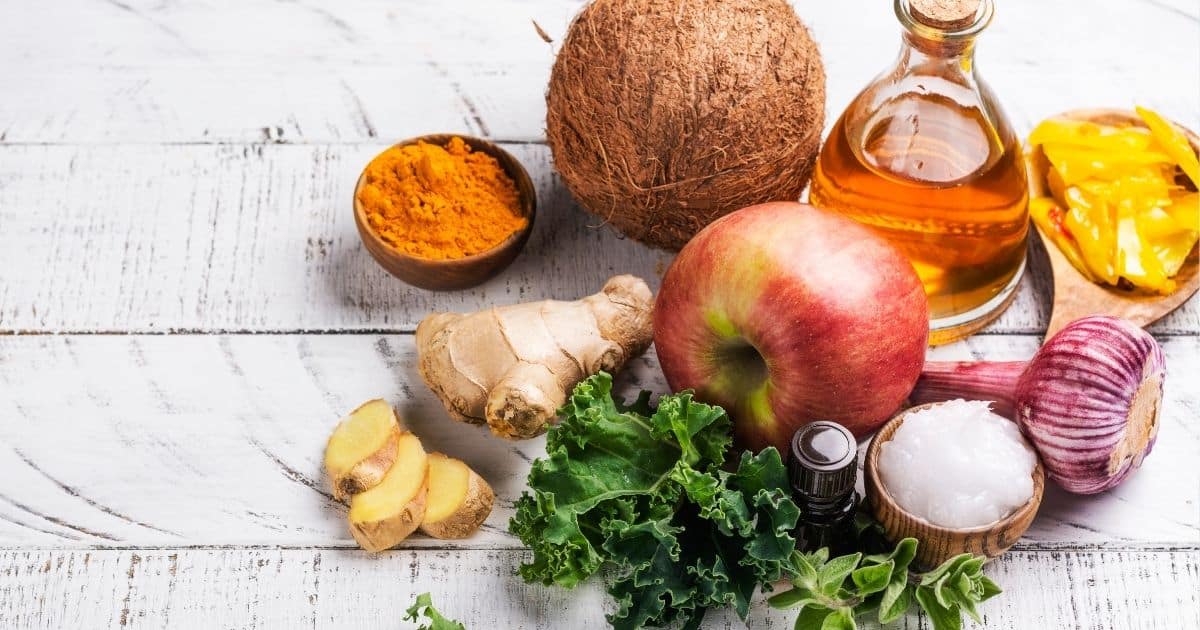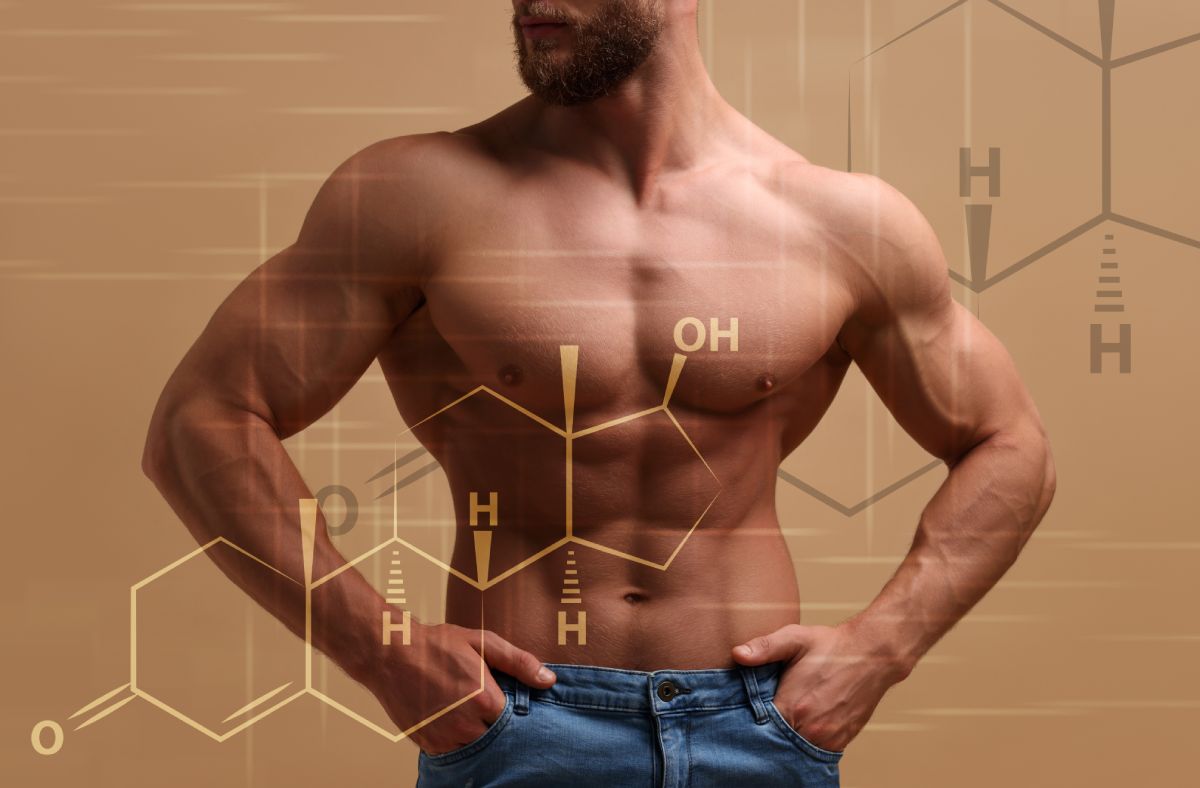Hey big man, are you feeling . . . not so big? That may have to do with the levels of testosterone you’re not producing.
If you’re over the age of thirty, you’re losing your natural levels of testosterone with every year. It’s a natural process that we’ll get into more detail about later.
But that doesn’t mean you’re going to feel like this forever. There are supplements and testosterone boosting foods you can eat to help mitigate the problem.
Want to learn more about all of the above? Read on below.
What is Testosterone?
The hormones that make men, men and women, women (other than biology) are called reproductive hormones. They’re either estrogen, progesterone, or testosterone.
Every person has a mix of all three, but women have more estrogen and men have more testosterone.
These hormones don’t just decide when the ovary releases the egg and when someone gets an erection. Their jobs are more complex than that. Estrogen plays a role in fat production and storage while testosterone helps muscle and bone mass.
The more testosterone someone has, the easier it will be for them to grow their muscles. That’s part of the reason people get weak as they grow old, their testosterone levels naturally drop.
We see the highest levels of testosterone during puberty, which is a time most of us not-so-fondly remember. After the peak, they stay at a heightened level until about thirty.
After thirty, testosterone levels drop with time and you can notice the effects every year.
There are ways to prevent mass testosterone loss, though you can’t avoid it entirely. Leading an active lifestyle is a good way to keep your T levels up, but sometimes that’s not realistic.
Why Do People Lose Testosterone?
A lot of what we understand about the human body stems from what life was like years and years ago. Basically, the human body wasn’t designed to live the long lives we’re living now.
Modern medicine hasn’t been around that long when you compare it with the length of time humans have lived. Just two hundred years ago, in the 1800s, you’d be lucky to live to fifty.
Fifty was practically 100 in 19th-century terms.
When we weren’t living as long, things like having testosterone levels into old age didn’t matter as much. You were just happy you were alive, you weren’t worried about your T.
Our bodies haven’t caught up with the idea that we’re living longer. They’re still under the impression that we’re only going to live to four, maybe fifty.
We have to teach our bodies to adapt with the times. That’s what humans have always done and will always do. Each new generation is born with bodies that adapt to live longer and longer.
Did you know that scientists think the first person to live to 150 years old has already been born?
Now that you know why we lose testosterone as we age – don’t fret. You can teach your body to produce more T or at least supplement the amount your body isn’t making.
You’re not going to be low on T forever, it just may get harder to replace it over time (you’ll need more).
Not sure you’re low on testosterone or if it’s another problem? Let’s look at the effects of low T below.
Symptoms of Low Testosterone
When you think of a man, what do you think of? Gender roles aside, we generally think of strong, broad, hairy, tall, and deep-voiced.
Some of those factors stem from genetics, while others stem from testosterone levels. Others still come from a combination of both.
But when you’re low on testosterone, you may feel like you’re becoming “less” of a man, in the sense of “manly characteristics”. It makes sense that if testosterone causes something to happen, less of it would decrease the effect.
So – what are the symptoms of low testosterone? They’re different for everyone and they depend on the level of deficit you’re experiencing.
One of the biggest and easiest to notice one is a lack or decrease in your sex drive. When you used to get 10 erections a day, you may now only get six.
Or you’ll find yourself thinking of sexless or taking longer to get raring to go. If you’re single, then that’s not a problem – or maybe that’s what makes it such a problem.
While you may enjoy not thinking about sex so much, it’s not worth the effect on your intimate life. You need more testosterone to get back to the stud you’re used to being.
Another common side effect of having low T is a loss of energy. That can just be the day to day energy, like needing more coffee or needing more sleep.
Other times, that lack of energy can lead to other symptoms (that are already caused by low T), like weight gain. When you have less energy, you don’t make as good of choices as you do when you’re well rested.
You’re also less likely to make it to the gym or at least get your workout in. That can enhance the effect low T has on weight gain as well.
As if that wasn’t enough – low t can lead to thinner bones, which doesn’t help you out in the gym situation either. If you’re used to being active and feeling strong, you need more T, stat!
Low T can also affect
- Your Mood
- Self-esteem
- Hair growth
- Moodiness
- And secondarily, your romantic relationships
So – what’s the answer? What can you do about all this lost testosterone? You don’t have to suffer forever.
Testosterone Supplements or Injections
You can go the route of getting more testosterone from your doctor or from supplements. This is a very effective way to get your levels up quickly, but you’ll need continuous treatments.
They’re great as a quick fix or when you feel like your levels are really low. Then if you eat testosterone boosting food on top of regular T-treatments, you’ll be golden. You know, like you were in college!
Foods? Yes, There are foods that our precious earth grows that can help boost testosterone.
They’re not as effective or as intense as the effects you’d get from official treatments, but they’re cheap and easy to access.
Who Should Eat for Better T?
The question really is, who couldn’t benefit from a more Testosterone friendly diet? Most of these are healthy foods so your body will like them anyways.
But if you want us to really answer the question – there are three times when you should really use a T-friendly diet.
Time one is when you turn thirty and you first start to notice declining levels. Eating testosterone-friendly foods should be effective enough to fill in the small gaps you’re experiencing.
Try to make eating these foods a habit, so that you’ll experience less intense loss over time.
Time two is when you start T-treatment. You never know how your body will take to the treatments, ie. how long it will take to kick in. Eating testosterone boosting foods when you’re starting treatments will make them more effective.
Finally, it’s not a bad idea to eat these foods throughout the rest of your life. Won’t hurt, right? Remember – we have to teach our bodies to live longer.
Testosterone Boosting Foods
Before you go out and fill your entire fridge with each of these foods, read the next sentence. When you are seeking nutrients from food, you don’t build up your stores unless you eat these foods consistently.
You’re not going to eat one omelet, for example, and solve your T issues. But you’ll find that eating two eggs two days a week instead of cereal can make a difference.
Speaking of eggs, let’s start with those.
Food #1 Eggs (Zinc)
There are a few different foods with high zinc levels, but eggs are the most accessible and they’re a perfect food.
Other foods include meat and shellfish – but only of the highest quality.
Aim for 10 milligrams of zinc in your food daily, or a little less since absorbing vitamins through food is easier than getting them from supplements.
More zinc will not only help your fertility and libido, but it can help you stay healthy. Along with increasing testosterone production, it strengthens your immune system – which is why it’s usually sold along with vitamin C.
Food #2: . . . Sun? (Vitamin D)
Most people don’t spend enough time in the sun, which would be food if you were a plant.
With the amount people have to work nowadays to simply live and our lower activity levels, vitamin D deficiencies are very real. If you can spend fifteen more minutes in the sun per day, then you’re all set for this vitamin.
If you can’t or it’s winter or you have sensitive skin – you can get vitamin D supplements that do the job just as well. If you’re really going for it, then you can get a sun-light.
Food #3 Avocados (Healthy Fats)
The eighties saw an attack on nutritional fats. If it had fat in it, it was bad. And unfortunately, that attitude has followed for the last twenty years.
It wasn’t until people realize that the type of fats are what matter that they began to de-demonize the fat food group again.
And we’re still working on re-teaching society that fats can be okay. As long as you pick the good type – that occur naturally in plant-based foods.
Like avocados – they have a good amount of fat. Mix avocados into your smoothies if you don’t like the taste. It makes them super creamy and you can’t taste it.
It’s also good as a replacement for mayonnaise on sandwiches or alone warm with salt and pepper.
Avocados don’t just help people with their testosterone, they’re good for your brain. So if you’re older, don’t forget them for the brain boost.
They contain Omega fatty acids which are key to brain function.
Food #4 Leafy Greens (Control Estrogen)
Remember how we talked about everyone having a balance of estrogen and testosterone? When you lose your testosterone, your estrogen can become more dominant.
Don’t panic- you’re not going to grow breasts or anything. You may just feel a little moodier than usual.
However, there’s a certain chemical that can stop that, in leafy greens. When you digest them, they release a chemical that processes estrogen-like you naturally would.
When it comes to picking greens, the darker the color green, the better.
Food #5 Brazil Nuts (Selenium)
This funny sounding nutrient is really hard to get with the average American diet. Even the average good American diet because it’s only found in a few foods
We’re talking about three or four foods – like brazil nuts, liver, and some shellfish.
You can find multi-vitamins for men that have selenium mixed in, for your convenience, but you’ll absorb it better from food.
Living a Balanced T Life
There were five foods, well four, on this list. You can integrate four new things into your diet right? That’s not hard.
We’re not telling you to give up anything you love, just eat some more testosterone boosting foods. You can also look into habits you have (like wearing tight underwear) that could be hurting your sperm production (and therefore testosterone).
Feed your balls and let them hang cool and free. Give your body what it wants by upping your testosterone levels with good foods.
If you need more convincing, you can contact us and read our testimonials here – they’re the real deal.





